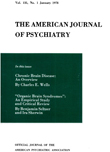EXAMINATION OF THE COMPLAINING WITNESS IN A CRIMINAL COURT
Abstract
The psychiatrist in his approach to the problem of crime finds ample opportunity to examine and evaluate offenders. The possibility of obtaining first hand information from and pertinent to the plaintiff is circumscribed by the "rules." A witness is required to appear in court and testify under oath but we cannot demand of him that he appear for psychiatric examination. This is only one of the many advantages the accuser enjoys over the accused.
Substantive and procedural regulations governing the administration of justice place all emphasis on "facts." What is "fact" is left to the judge and jury to decide. The assumption is that fact is a phenomenon in reality. Our experience places us in the group of those who substantially contend that "facts" establishing the guilt of an accused person are not always realistic in nature. This is particularly so in instances where crime has been committed against an individual. The acting out of unconscious drives leads not only to acts of aggression called crime but also to false accusations resulting at times in erroneous convictions of the innocent.
Access content
To read the fulltext, please use one of the options below to sign in or purchase access.- Personal login
- Institutional Login
- Sign in via OpenAthens
- Register for access
-
Please login/register if you wish to pair your device and check access availability.
Not a subscriber?
PsychiatryOnline subscription options offer access to the DSM-5 library, books, journals, CME, and patient resources. This all-in-one virtual library provides psychiatrists and mental health professionals with key resources for diagnosis, treatment, research, and professional development.
Need more help? PsychiatryOnline Customer Service may be reached by emailing [email protected] or by calling 800-368-5777 (in the U.S.) or 703-907-7322 (outside the U.S.).



